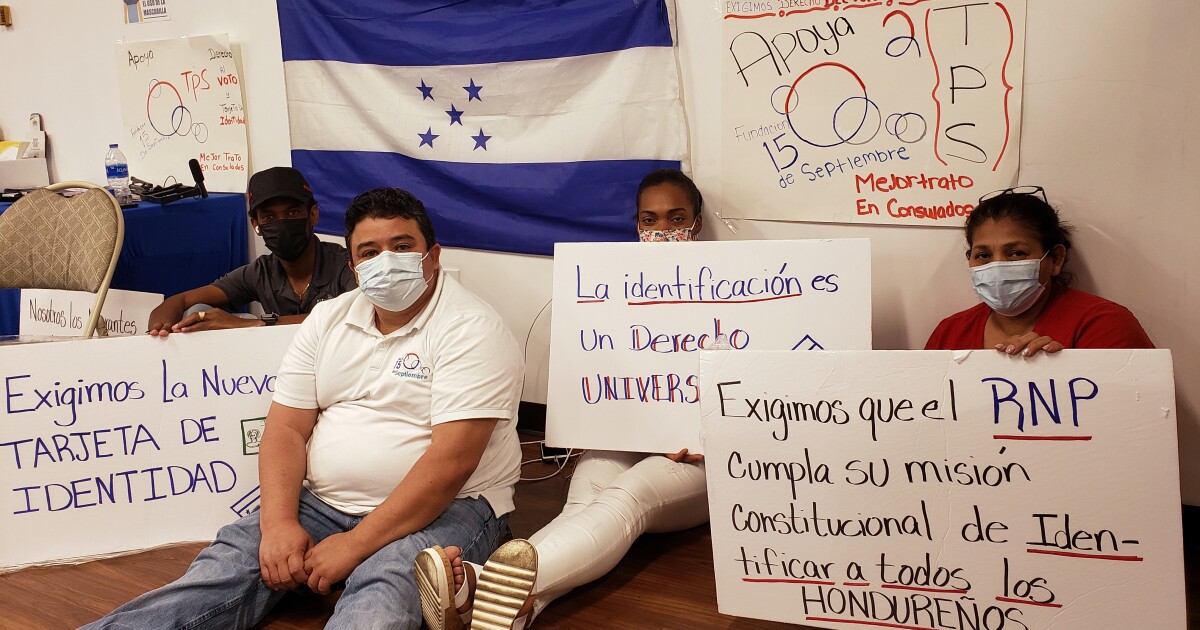Hondurans in the US fear being left without a permit from their country

More than a million Hondurans in the United States have been left without their country’s new identity card and, for the time being, without the ability to vote in the general election on November 28 in Honduras.
The problem goes beyond the elections: ID cards that expired on October 15 and without the new ones, it is feared that they will not be able to conduct any action at 14 consulates in the United States.
The lack of identity cards is due to the fact that the majority of Hondurans living here were not included in the new “recruitment” process, as it is known in Honduras, or the purification of people’s registration carried out by the state. Registration began in 2020 in Honduras and is carried out through specialized machines for taking fingerprints and other data.
Once a person is registered, the card is issued, which can take months to be delivered to the respective Honduran or Honduran.
The National Registry of Persons (RNP), responsible for “registration”, ensures that the State Department is responsible for carrying out the process in the United States while the State Department ensures that it is the RNP that must send specialized teams and individuals in the United States to enroll Hondurans there. Meanwhile, frustration is mounting among the Honduran community, which lives mostly in states such as Texas, New York, New Jersey, Florida and California.
Juan Flores, head of a group called Fundación 15 de Septiembre, confirmed he was “outraged” that Hondurans living abroad contribute millions of dollars in remittances back home.
However, they will now be left without identity unless Honduras extends the expiration period of old cards, he said.
“We’re extending this call to Congress,” Flores said. “This is a problem that we have to pay attention to because it is a national security problem, both for Honduras and for the United States, because it is possible that there are citizens on the territory of the United States who do not know which country they are from? That they do not have an identity and that they cannot obtain it.”
Honduran authorities estimate that between 1.5 and 2 million Hondurans live in the United States. According to the latest data from the US Census, there are just over a million people but many of them arrive via irregular roads and do not register in the census, so the number could be higher.
Honduras is expected to elect a new president on November 28 after eight years under Juan Orlando Hernandez. There are 15 candidates for the presidency, but Nasri Asfoura from the ruling National Party. Yanni Rosenthal of the Liberal Party, Xiomara Castro of Zelaya de Libre, and Salvador Nasrallah of the Honduran El Salvador Party have the best chance of winning.
The participation of Hondurans living in the United States in the electoral process of their country is usually very low. The problem will be short-term for many if October 16 arrives and they cannot undertake procedures such as renewing passports, the document the United States accepts in schools, banks or hospitals.
The Honduran Ministry of Foreign Affairs confirmed that months ago RNP staff and “registration” teams were asked to start the registration process in several US cities.
Deputy Foreign Minister Nelly Jerez told the Associated Press that the Royal National Police moved equipment to 14 cities, but after a short time, they caused damage and failures and had to be sent back to Honduras.
“Of the 26 teams, 21 came back completely burnt and bad,” Jerez said. “The rest stayed in Seattle, Boston, Charlotte and Miami. The Miami and Charlotte problems have already posed problems so we can’t do more.”
The vice chancellor said: “As long as the record does not go out with the teams and does not go out with the battalions, we can do nothing in the consulates because we do not have the teams.” He added that while the teams were operating in the United States, about 13,000 Hondurans were registered. “So far, the Registry has not sent us the ID card (to them),” he confirmed.
Oscar Rivera, the Rwandan National Police judge, confirmed that the entity to which he belongs is not responsible for the offshore “registration” procedure, but the Chancellery.
“We only accompany the State Department, which operates this service,” he told The Associated Press. “More than six months ago, we allocated (to the chancellery) 100 sets (of ‘registration’) to be installed in consulates,” he added.
Regarding the possibility that Hondurans who do not have their ID cards will not vote in the elections, Rivera said, “Voting is the work of the National Electoral Council.” If the National Electoral Council maintains its position that it is possible to vote only with the new card, it will be assured that many Hondurans abroad will not participate in the elections.
Hondurans in the United States this year demonstrated at various consulates to demand a new identity document. “Many immigrants who left Honduras after 2017 lost their identities or were taken away by (US) immigration. Many do not have a (Honduran) identity in the United States to do paperwork,” Flores said. “So we are in serious trouble.”

“Coffee fanatic. Gamer. Award-winning zombie lover. Student. Hardcore internet advocate. Twitter guru. Subtly charming bacon nerd. Thinker.”











